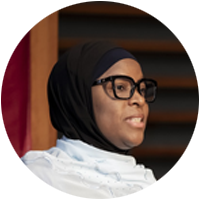Kikelomo Babata, MD | Global Clinical Scholars Research Training

Kikelomo Babata, MD, has had an impactful career in pediatrics and neonatal-perinatal medicine. As a neonatologist and assistant professor at UT Southwestern Medical Center in Dallas, she has cared for some of the most vulnerable patients and mentored several medical students, residents, and fellows. Even with years of professional experience and academic training, Babata reached a point where she felt there was more to uncover about the research studies shaping both the clinical care she provided her patients and the methods she taught her students.
After earning her medical degree from the University of Ilorin in Nigeria, Babata pursued the path of an international medical graduate, beginning her pediatrics residency at Bronx-Lebanon Hospital Center in New York. She built a diverse clinical foundation during four years as a general pediatrician at the Mayo Clinic Health System in Wisconsin, and then accepted a neonatal-perinatal fellowship at Tufts Medical Center in Boston. By the time Babata joined UT Southwestern Medical Center as a clinician and assistant professor, she was a seasoned physician.
As Babata progressed in her academic career, she realized that exceptional methodological rigor was the key to designing successful scientific studies. She also recognized that mastering advanced methodologies in research study design would position her to transform patient-care insights into evidence-based advances. To that end, she enrolled in Harvard Medical School’s Global Clinical Scholars Research Training program.
“As doctors, we often learn from theory. We are taught to recognize evidence-based medicine and randomized clinical trials, but I wanted to pull back the curtain and really understand the mechanics of data analysis and study design,” she says.
During the yearlong Global Clinical Scholars Research Training program, learners dive into hands-on data analysis, applying their skills to real-world datasets. For Babata, working with the Framingham Heart Study Dataset during coursework, a comprehensive collection from a decades-long cardiovascular study to predict 10-year risks for coronary heart disease and other cardiovascular events, was a turning point.
This exercise provided a practical lens through which she could deepen her understanding of what goes into designing transformative research studies. “The best part of the program was getting hands-on with data analysis and learning the software,” she reflects. “It transformed how I understand research papers and gave me the skills to design my own future randomized controlled clinical trials.”
Armed with new practical research skills, Babata quickly put her knowledge to work. During her Global Clinical Scholars Research Training capstone project, she leveraged a 46-year neonatal dataset at her hospital to develop a predictive model aimed at enhancing neonatal care by identifying at-risk infants in their first 48 hours. Her goal was to determine what worked, what didn’t, and how future care could improve. “We owe it to our patients to figure out which changes in the clinical research process can lead to better outcomes, and to make sure we’re doing more of that,” she explains.
Beyond her research, Babata discovered an unexpected passion for scientific communication. Now serving as a social media editor for Pediatric Research, she’s dedicated to making research more accessible and engaging. “It’s more than just publishing papers,” she notes. “It’s about ensuring that the science reaches people.”
To strengthen her communication skills, Babata also completed Harvard Medical School’s Effective Writing for Health Care certificate program, applying insights from both programs to amplify the impact of clinical research. “In a time when science is under attack, it’s crucial to show how research has transformed care and saved lives,” she reflects.
One of the most impactful aspects of Babata’s time at Harvard Medical School was the people she met. She found herself immersed in a network of peers from across the globe, spanning specialties she may not otherwise have crossed paths with.
“It feels like there’s no corner of the world where I don’t have a friend now,” she says. “I met surgeons, anesthesiologists, obstetrician-gynecologists, physical therapists, even lawyers—people who expanded how I think about medicine and research. It’s a network I lean on every day.”
One of Babata’s proudest moments came when she was nominated and elected by her classmates as their graduation speaker. In a culmination of the year’s work and lessons learned, she reflected on not only their clinical research journey but also their perseverance and bold thinking.
“The people who are crazy enough to think they can change the world are the ones who do,” she says, quoting Steve Jobs. “It’s easy to doubt yourself when you’re chasing a new idea or trying something unconventional. But those are the ideas that push medicine forward. I wanted my classmates to know that their work matters, and that they shouldn’t stop, even when people think they’re crazy.”
Her advice to fellow clinicians and researchers? “Don’t hold back. Go all in. It’s easy to coast when you’re already established in your career, but real growth happens when you push yourself into unfamiliar territory. You owe it to yourself, and to your patients, to learn everything you can and to share what you discover.”
Written by: Meredith Faxon